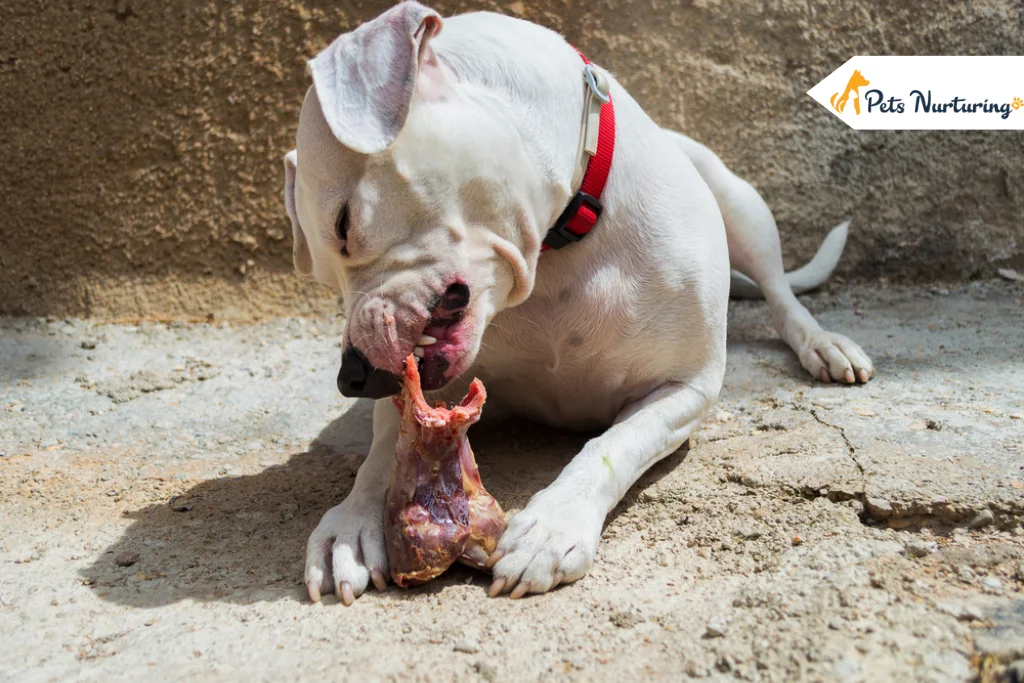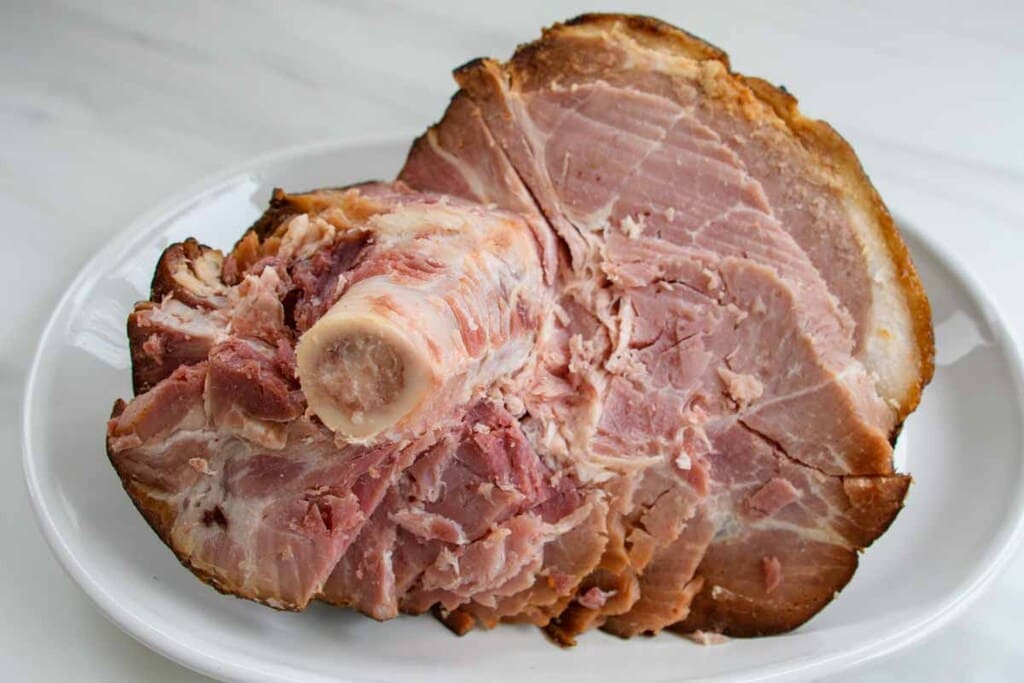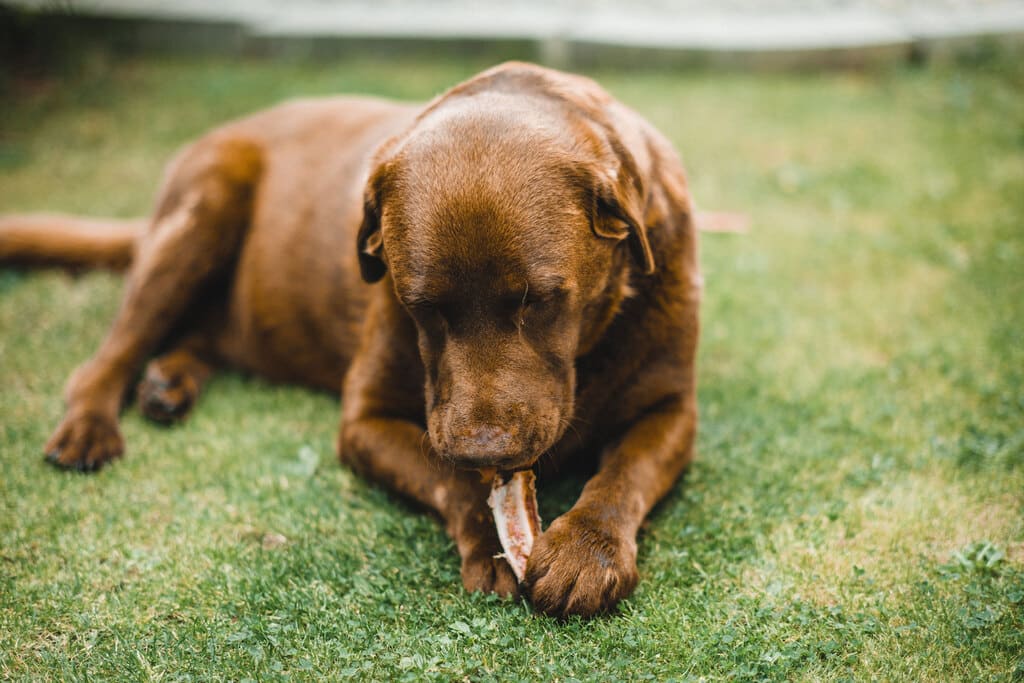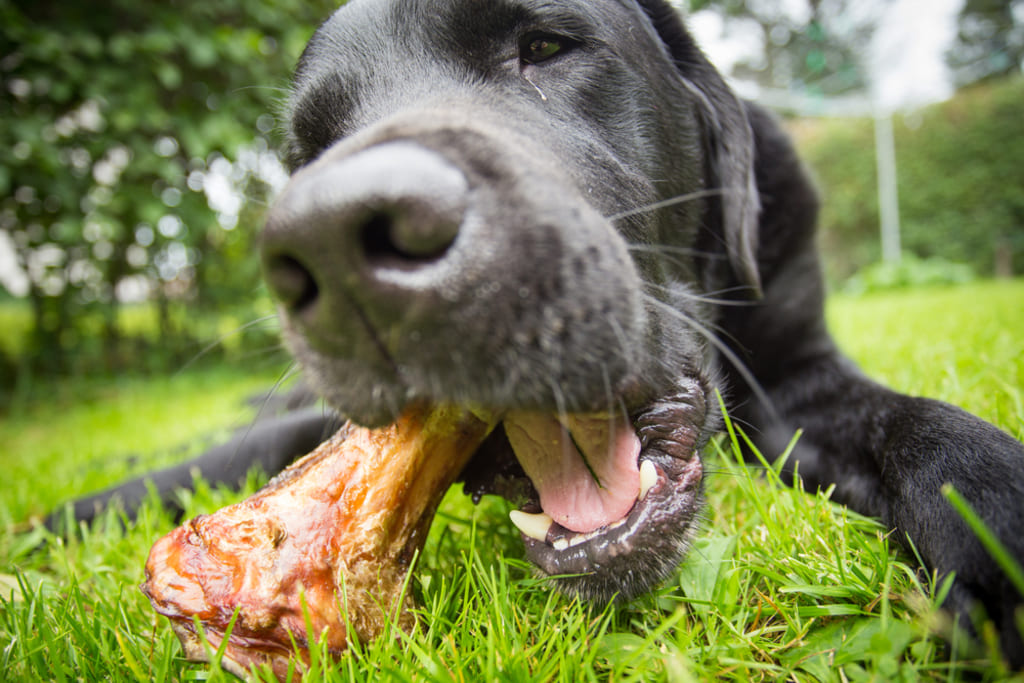
As loving pet owners, we often tend to share our food with our beloved pets. This definitely feels heartwarming, but it’s crucial to remember their health comes first. Certain human foods are delicious to us, they can be toxic to pets, potentially resulting in serious health complications. Let’s take an example of ham: can dogs have ham? Yes, ham can be given to dogs, but only in small quantities. What about bones? It’s a common belief that all dogs love bones. So, can dogs eat ham bones? Read on to unlock the truth about: Are ham bones good for dogs? I have also further explained what to do if your pup accidentally ingests a bone and suggests the best alternatives to ham bones.
So, let’s start.
Can Dogs Eat Ham?
Yes, dogs can eat ham, but it is advised to give them only in small quantities. Ham meat isn’t toxic to dogs, but constantly giving ham to your pup in large quantities can cause several health issues. Ham is highly rich in fat and salt content, which can trigger pancreatitis, cardiac problems, and sodium ion poisoning. So, before offering a thin slice of ham to your beloved pooch, consider its health condition. This is why mostly it’s recommended to go for safer protein sources instead of ham meat, or else consult your vet before.
Is Ham Good for Dogs?

Whether it’s a ham slice or holiday ham, it is considered processed meat that has gone through a curing process. That’s why it has high amounts of sodium, sugar, salt, and other preservatives. And all these things are not healthy for canines, so ham bones for dogs are not considered good.
Why can’t dogs have ham?
Giving ham to dogs on a regular basis or in large quantities can lead to:
- Vomiting
- Diarrhea
- Excessive drooling
- Abdominal pain
- Bloating
- Lack of appetite
- Excessive thirst
- Lethargy
- Seizures
- Excessive Urination
- Abnormal fluid accumulation
- Kidney damage
Can Dogs Eat Ham Bones?

No, dogs can’t eat ham bones.
Whether it’s raw or cooked, ham bones are toxic for dogs. Ham bones can easily break into pieces, and can get stuck in a puppy’s throat when eating it. Raw ham bones are hard, contain bacteria, and pose serious health risks. Are cooked ham bones bad for dogs? Even if you cook the ham bone and it becomes soft, it can still splinter and damage your puppy’s mouth (particularly teeth) and digestive system.
Sometimes, eating bones can pose a choking hazard or even cause extensive internal damage when the bone gets stuck in the GI tract. This can put a puppy in a life-threatening situation, and your dog could end up in the ER.
Overall, ham bones pose high potential risks, so you should avoid giving ham bones to canines.
What to do if your Dog Ate a Ham Bone?
If your dog has eaten small amounts of cooked ham meat, there is no need to worry. However, if it is in large amounts, you need to take action. First monitor them for a few hours, because, in most cases, there is no immediate reaction. Ham has a high fat and salt content, which can cause gastrointestinal or neurological problems. You should check for health signs such as vomiting, diarrhea, or constipation. If your pup has these symptoms, you should immediately contact your nearest vet.
So, what happens if my dog eats ham bones?
When you notice that your pooch is eating a ham bone, you should immediately take them to the veterinarian. Even if your dog has no signs of illness and seems completely fine, still visit the vet. That’s because the broken-off pieces of bones can cause choking, perforation, or internal obstruction. In such cases, your dog would require emergency surgery to remove the bone pieces. This is why it’s best to get your dog checked as soon as you find out.
What Kind of Bones Are Safe for Dogs?

Bones are considered an excellent food to add to your dog’s diet, as they are a rich source of minerals and other nutrients. Chewing bones has other benefits, such as stimulating saliva enzymes and preventing plaque buildup on teeth. However, not every bone (like ham bones) is healthy for your dog.
If not ham bones, then what bones are healthy for dogs to eat?
Here is a list of bones that you can give to your pup:
- Raw Bones (chicken, turkey, beef)
- Large, Raw Recreational Bones (marrowbones, knucklebones)
- Edible Bones (rawhide, certain dental chews)
- Commercially Sold Dog Bones (nylon, synthetic)
- T-bones or Steak Bones (may splinter)
- Synthetic Bones and Chews (nylon or rubber chew toys)
- Cooked Bones (may splinter)
- Fish Bones (may splinter)
- Small, Cooked Bones (chicken, pork)
- Rib Bones (may splinter)
Conclusion
Now you know why you should not give ham bones to dogs and what to do when your pup accidentally eats them. You can add small pieces or slices of ham meat to your dog’s diet from time to time, or try other safe bone options mentioned above. Ham bones can break easily even if properly cooked and cause health concerns like coughing, vomiting, kidney damage and seizures. So keep your beloved dog away from the ham bones.
Explore Further:











